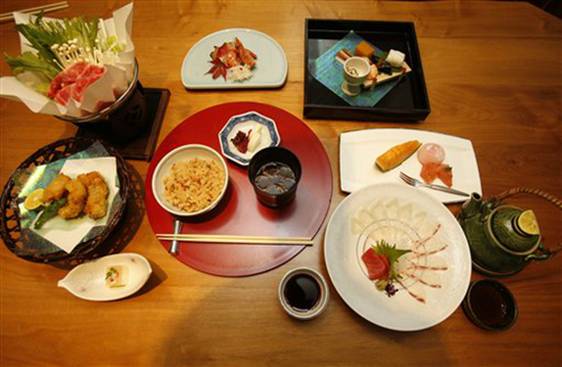Posted on Mainichi Japan on Dec. 5, 2013
http://mainichi.jp/english/english/newsselect/news/20131205p2g00m0dm001000c.html

In this Nov. 27, 2013 photo, Japanese dishes are served on a table for dinner at Japanese restaurant
Irimoya Bettei in Tokyo. (AP Photo/Shizuo Kambayashi)
TOKYO (Kyodo) — “Washoku” traditional Japanese cuisine was added to UNESCO’s Intangible Cultural Heritage list Wednesday, raising the government’s hopes of enhancing its global recognition, attracting more foreign tourists and boosting exports of the country’s agricultural products.
The Japanese government’s proposal was formally approved by the U.N. Educational, Scientific and Cultural Organization at a meeting of its Intergovernmental Committee in Baku, Azerbaijan, Japan’s cultural affairs agency said, adding that the panel valued the spiritual tradition of respecting nature associated with washoku.
The move comes as the country faces a low food self-sufficiency rate of around 40 percent on a calorific intake basis as well as the spread of Western eating habits. Washoku became the 22nd Japanese asset to be listed on UNESCO’s Intangible Cultural Heritage list, which also includes Kabuki, Noh and Bunraku.
“We are truly happy,” Prime Minister Shinzo Abe said of the UNESCO recognition in a statement released early Thursday morning. “We would like to continue passing on Japanese food culture to the generations to come … and would also like to work harder to let people overseas appreciate the benefits of washoku.”
The Japanese government is hoping that the registration will help ease safety concerns over the country’s food products following the Fukushima nuclear disaster triggered by the March 2011 earthquake and tsunami.
As changes in social and economic structures as well as the globalization of food have raised concern about whether communities can continue to pass down traditional Japanese dietary cultures, the government also hopes the heritage listing will help the younger generation to recognize the value of such cultures.
Kiyotoshi Tamura, an official of the Organization to Promote Japanese Restaurants Abroad, expressed hopes that efforts will be made to advertise Japanese foods, saying, “The recognition of Japanese cuisine will definitely increase. I hope people around the world will familiarize themselves and promote it.”
The government made a proposal for UNESCO registration of the country’s food culture in 2012, backing a campaign initially launched by the Japanese Culinary Academy, a nonprofit organization made up of chefs in the ancient Japanese capital of Kyoto and other parts of Japan.
In its proposal, “Washoku: Traditional dietary cultures of the Japanese,” the government said Japanese food across the country has basic common characteristics but also has “great diversity” based geography and history, leading to the use of various kinds of seafood and agricultural products.
It also said Japanese food has developed as part of daily life, has a strong connection to seasonal events such as the celebration of New Year and is constantly recreated in response to changes in the natural and social environments.
In October, the UNESCO body recommended Japanese food be recognized as intangible cultural heritage, saying it plays a major role in social solidarity.
UNESCO had previously registered four food cultures — French cuisine, traditional Mexican food, the Mediterranean diet in countries such as Spain and Italy, and “keskek,” a Turkish ceremonial dish — as such assets.
December 05, 2013(Mainichi Japan)
http://mainichi.jp/english/english/newsselect/news/20131205p2g00m0dm001000c.html
